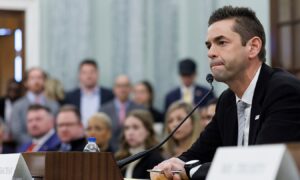The argument in the House over whether to give $14 billion in emergency aid to Israel is revealing political fissures and giving the impression that the United States is a divided superpower unable to quickly provide assistance to a country that is facing an existential war.
Republicans in the House of Representatives have stated they want to vote on the bill this Thursday, but the party’s unstable majority makes any timeline impossible to predict. There is a growing danger that domestic political divisions and a lack of agreement on foreign policy could paralyse government and undermine American efforts abroad.
Republicans in the House of Representatives, including Majority Leader Steve Scalise and Whip Tom Emmer, have indicated that they plan to vote to approve the package later today.
This shouldn’t be so challenging.
For a long time, a vote on aid to Israel was perhaps one of the least contentious matters brought before the House. The bill has been stuck in committee for a while, the balance of power in Washington is precarious, and there are feuds between and within both parties over the new Middle East war.
Newly elected House Speaker Mike Johnson has decided to offset the cost of the $14.3 billion in aid to Israel by cutting the budget of the Internal Revenue Service by the same amount. This is popular with conservatives but means that many Democrats will vote against what they regard as a political stunt.
But on Thursday, Johnson stood by his plan to tie Israel aid to IRS budget cuts. That attachment was not made for partisan reasons. To return to the idea of fiscal responsibility, I’ve attached it,” the speaker told the press. To put it another way, “And that was the easiest and largest pile of money that’s sitting there for us to be able to pay for this immediate obligation.”
President Joe Biden’s decision to include the Israel package in a much larger request that also contains the next batch of weaponry and ammo for Ukraine has pulled both requests farther into the political muck. The Johnson conference has reservations about the over $100 billion in requested spending. There is already a delay in getting US help to Israel during its fight with Hamas since the speaker is advancing an Israel bill on his own while the Senate may attach Ukraine funding and send it back to the House.
A year before the next election, the debate is shedding light on a number of hidden political narratives. It’s also helping China and Russia in their efforts to undermine US strength by creating a picture of American disintegration.
Johnson’s plan exemplifies how the most conservative members of the Republican Party are not afraid to take a stand on topics with far-reaching domestic and international consequences. Like his departed predecessor Kevin McCarthy, the Louisiana Republican cannot assure a functional GOP majority without making compromises to its most conservative members, as seen by his choice to add IRS offsets. However, the Democratically controlled White House and Senate make it highly improbable that these measures will ever be approved. For example, Vice President Biden has already stated that he will veto the present House bill if and when it reaches his desk. But Johnson is pushing forward, suggesting he may be guided by the more conservative members of his party rather than the other way around.
If the bill can be passed without further snags, the speaker may come out ahead. But he also runs the risk of putting himself in a position that undermines his authority before he has established a solid political base. While his IRS manoeuvre could secure sufficient GOP votes to pass the measure, it won’t change the reality of shared authority in Washington. At some point, he will have to introduce legislation that has a chance of passing with the Democratically controlled House and Senate. That might force Trump to rely on Democratic votes for final passage, which is exactly what infuriated far-right GOP members and ultimately led to McCarthy’s downfall and three weeks of comical power vacuums in the House. And if the Israel voting schedule is delayed, Johnson will lose even more time before a government shutdown that can only be prevented by a financing bill that is far more difficult to pass than the Israel proposal.
— The fight over aid is also shining a light on the deep schism that has opened up inside the Republican Party over foreign policy between Make America Great Again isolationists and the old school establishment, which promotes strong global leadership through alliances that have helped secure global peace since World War II. There is tension between Johnson and Senate Minority Leader Mitch McConnell, a conservative who is closer to Joe Biden than to his own party in the House, because Johnson separated support for Israel from funding for Ukraine. “Over and over again, history has taught us that the costs of disengaging from the world are far higher than the costs of engaging,” McConnell said Wednesday as Johnson crossed the Capitol for lunch with Republican senators. “As dangerous as it is to pretend that, as a global superpower, our nation could not or should not face each of these down, it is just as foolish to deny the clear link between America’s adversaries and the threats we face.”
In addition to highlighting the rift within the GOP, the struggle over aid to Ukraine also highlights the broader question of whether the United States and its people are prepared to continue to be a bastion for global democracy, as McConnell said. This is a fundamental issue that might divide voters between Biden, a Cold War-era internationalist, and former President Donald Trump, a transactional leader who sees alliances more as protection rackets than multipliers of American global power. After all, at stake in the Ukraine dispute is whether or not the United States will maintain its support for Ukraine’s sovereignty as the Kremlin plots a brutal invasion. Some Republicans in the Senate, and a rising number of Republicans in the House, appear to choose Russian President Vladimir Putin over Ukraine’s democratically elected leaders in Kyiv.
However, after Johnson attended the monthly Senate policy lunch on Wednesday, supporters of Ukraine saw some grounds for hope. Despite his long-held scepticism of Ukraine help, the Louisiana lawmaker seemed to hint that, as speaker, he had responsibilities that went beyond his personal political inclinations. Johnson said last week on Fox News that the United States shouldn’t give Ukraine over to Putin. Oklahoma Sen. Markwayne Mullin told reporters that the rookie speaker signalled an openness to authorising Ukraine funds if it had support from House Republicans. South Carolina Senator Lindsey Graham, a supporter of aid for the conflicted nation, remarked that he was “blown away” by the keynoter’s grasp of international affairs. But as the past two weeks have revealed, there is a huge chasm between a Republican speaker’s ambitions and his actual powers. Funding for Ukraine is quite unlikely to be approved with just the Republican majority voting in favour. Therefore, he will once again be dependent on Democratic support, which could endanger his position as speaker.
While Republican infighting over foreign policy grabs much of the news, Biden is increasingly struggling to deal with the political fallout at home from Israel’s conflict with Hamas. Hundreds of civilians have been killed in what Israel claims are targeted operations targeting leaders of the Islamist militant group in Gaza, and some prominent progressives are becoming increasingly critical of Israel’s conduct. Democratic tensions will rise to the surface during the House discussion over the aid package for Prime Minister Benjamin Netanyahu’s cabinet.
On Wednesday, while visiting Minnesota, the president was confronted by such rage when a woman calling herself Rabbi Jessica Rosenberg began yelling “ceasefire now.” Biden said he understood the “emotion” and supported a humanitarian ceasefire in Israeli efforts to free detainees in Gaza. After the terrorist strikes on October 7 that murdered 1,400 people in Israel, most of them civilians, he has failed to openly call on Israel to commit to a truce with Hamas.
A year before the election, the president is in a precarious political position and cannot risk a poor turnout among progressive and Muslim voters who favour the Palestinians in swing areas like Michigan. Plans for a new strategy to battle Islamophobia in the United States were announced by the president on Wednesday, an apparent sign the White House acknowledges the possible political risks. At a time when antisemitism is on the rise in the country, this endeavour may put Biden in the line of fire for Republican assaults. However, the president now faces a new set of perilous political perils at home as a result of the turmoil in the Middle East.









